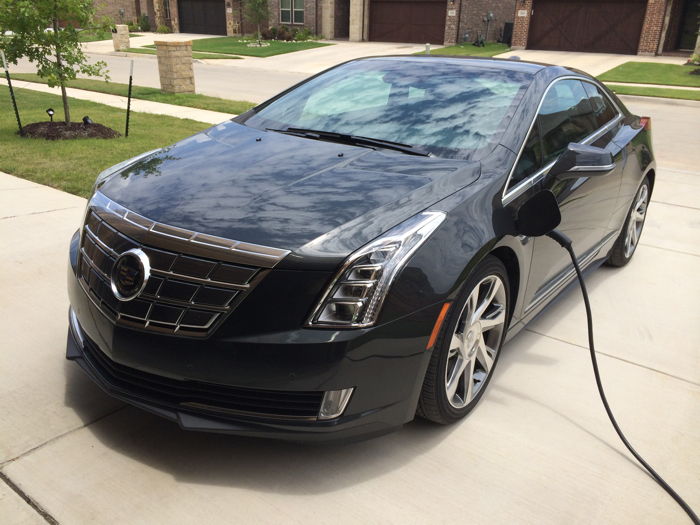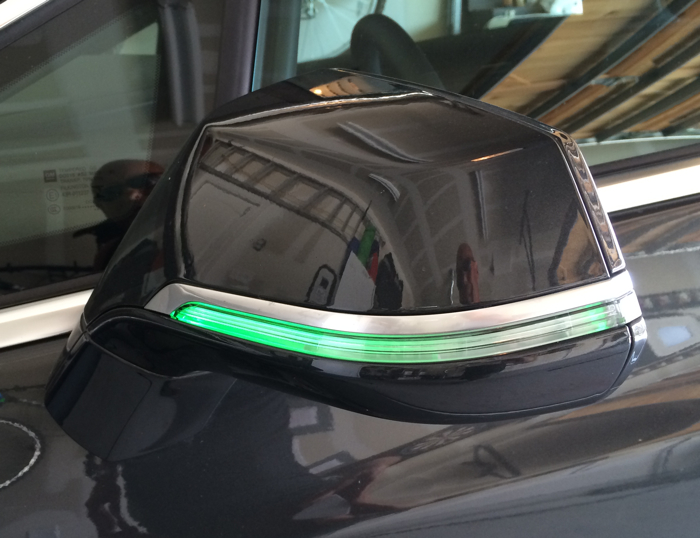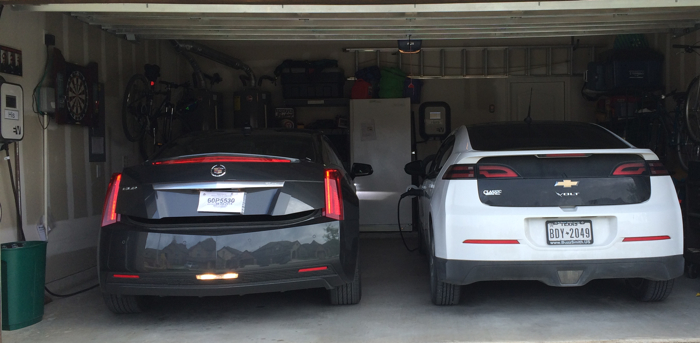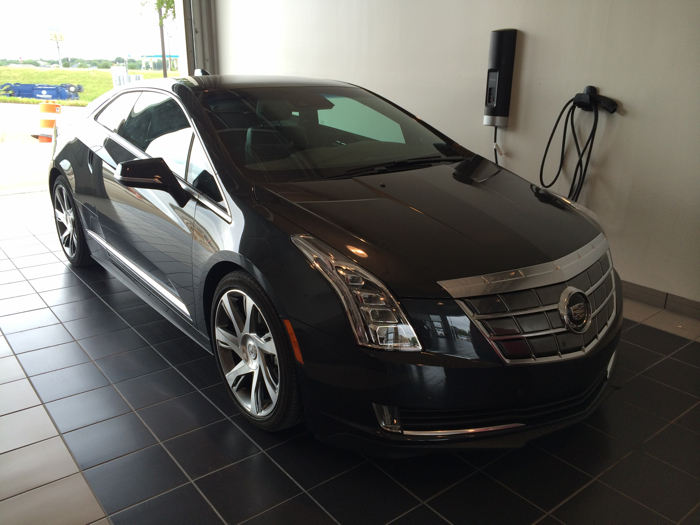Note: A video test drive will be uploaded soon. This first test drive video is also a primer on EVs, so lots of comparisons to the Volt are made. Future test drive videos will be a summary review of the vehicle, matched to more details in the review post. Here’s the first one:
Recently, I was contacted by the guy who leased our two Volts to us, Kevin Reese. He had moved to a Cadillac dealership, in Weatherford, Texas, and wanted to know if I’d like to drive a Cadillac ELR for a couple of days to try it out. His new location is Jerry’s Cadillac and it’s just a fifteen minute drive West of Fort Worth. Of course, his question was rhetorical. He knows I’m an EV nut and that I’d jump at the chance to drive an ELR!
On my day off, I dropped my daughter Zoe at school and drove out to meet with Kevin. I arrived to find the ELR plugged in, fully charged and ready to go.
I contacted a good friend of mine, Charles Mills, an accomplished videographer/editor to see if he’d be interested in shooting and editing a test drive video. I had acted in a few of Charles’ productions, including an entry in the Dallas 24 Hour Video Race. That year we got 3rd place and I got to see my face on the big screen of the Algelika Film Center in Dallas, when the top contenders were shown. Charles and his friend, Darren Pike shoot wedding videos that look like real motion pictures. If you’re in North Texas and getting married, you need to meet these guys!
But that’s not why you’re here, reading this post, is it? You want to know about the ELR, right? Well, let’s get started.
 The styling of the ELR’s exterior is amazing. It puts the four door Cadillacs to shame. That being said, having just two doors can be a pain, if you have to load passenger into the back seat very often. There is a button on the side of the front seats that uses a motor to move the seat position, when you tilt the back of the seat forward, giving the passenger room to enter the back seat area. It’s the same motor used to adjust the seat position, so it’s not very fast. (Did you notice that Volt owners? Yes, the ELR has power seats!) The ELR is a bit bigger than the Volt. It is 2.3 inches wider and its wheelbase is 0.4″ longer. However, it is shorter, in height, than the Volt by almost 3/4 of an inch, which decreases the headroom in the ELR by 0.9″, compared to the Volt. Hey, they’ve got to put that sound-deadening insulation somewhere! It definitely has a sleeker look than the Volt and I like the looks of the Volt. That being said, the ELR generates more looks from other drivers and passersby than my Volt ever did. One of my neighbors, whose wife works for GM, stopped me, as I was leaving one morning, to take a photo of the ELR. (His wife worked on the Volt project when they lived in Detroit…) At work, when I pulled into my usual parking spot near the chargers, a woman who I’ve seen many times when I arrived, asked, “What kind of car is that?” (I did not know her name and she’d never spoken to me before!)
The styling of the ELR’s exterior is amazing. It puts the four door Cadillacs to shame. That being said, having just two doors can be a pain, if you have to load passenger into the back seat very often. There is a button on the side of the front seats that uses a motor to move the seat position, when you tilt the back of the seat forward, giving the passenger room to enter the back seat area. It’s the same motor used to adjust the seat position, so it’s not very fast. (Did you notice that Volt owners? Yes, the ELR has power seats!) The ELR is a bit bigger than the Volt. It is 2.3 inches wider and its wheelbase is 0.4″ longer. However, it is shorter, in height, than the Volt by almost 3/4 of an inch, which decreases the headroom in the ELR by 0.9″, compared to the Volt. Hey, they’ve got to put that sound-deadening insulation somewhere! It definitely has a sleeker look than the Volt and I like the looks of the Volt. That being said, the ELR generates more looks from other drivers and passersby than my Volt ever did. One of my neighbors, whose wife works for GM, stopped me, as I was leaving one morning, to take a photo of the ELR. (His wife worked on the Volt project when they lived in Detroit…) At work, when I pulled into my usual parking spot near the chargers, a woman who I’ve seen many times when I arrived, asked, “What kind of car is that?” (I did not know her name and she’d never spoken to me before!)
The ELR is noticeably faster than the Volt, but not by much. The torque advantage goes to the ELR, which has 22 lb./ft. more than the Volt (295 vs. 273). The ELR isn’t quite as frugal with gasoline. The 2014 Volt is rated at 35 MPG, when running on gasoline, while the ELR hits 31 MPG. (My 2012 Volt gets 37 MPG on gas, consistently) Both vehicles have a 9.3 gallon fuel tank capacity. One interesting thing about mileage: I left home, to drive to the dealership, with a full charge in my Volt. About a block or so from my destination, the Volt ran out of juice and switched to the gasoline engine. I picked up the ELR with a full charge and, on the way home, pulled off the freeway a bit to drop off a package. I then picked up a friend, at his office, and we went to lunch. In total, I probably drove 3 or 4 miles on these errands but I still had a couple mile’s estimated electric range when I got back home! It has been suggested that this was due to a change in elevation, but this is North Texas and it’s pretty flat. I checked on this and it is true that Weatherford, Texas is 400 feet higher in elevation than Fort Worth.
Charging the ELR is very similar to the Volt. Like the Volt, there is a green/amber light atop the dash that lets you see, at a glance, the charging status. But even that has been jazzed up in the ELR. The two outside mirrors have green lights that fade on and off, during the charge. Once the charge is complete, the green lights on the mirrors goes out. (see below)
Getting in the ELR and closing the door is a very nice experience. The feel is solid and outside sounds are muffled very well. The startup sounds are different than those of the Volt, with a richer, deeper sound. The controls’ locations are different from the Volt’s, so that was a bit distracting and I never completely adapted to the ELR’s layout over the two day test drive.
There is a hatch at the base of the center stack that I discovered accidentally. Touching a silver bar at the door’s bottom caused it to open, sort of like an old-style garage door. Behind this is a USB port for your phone. I drove with my iPhone completely out of site but still usable. The cup holders in the front console area are beneath a motor operated sliding door. Just a bump on the chrome edge and it slides out of your way. There is a lot of shiny, black plastic on the console and it seemed to pick up fingerprints easily. I tried to avoid touching those surfaces as I knew the smudges would bug me.
Driving felt very smooth, almost like gliding. It is a very quiet experience. The insulation in the ELR definitely keeps noise out. The sound system was very good and I found myself lost in thought at times, as I drove. In fact, one day while on the way to work, I completely missed my exit! It wasn’t that I was not paying attention to the road. I was. It was more as if I was soothed into enjoying the driving experience but not caring where it lead…
The ELR is equipped with paddles behind the steering wheel. This increases the energy capture when slowing down. Just as in the Volt, there are four driving modes, Tour, Sport, Mountain and Hold. As I do in my Volt, I mostly drove in Sport mode, with the shifter in the “L” position. This causes the car to slow down in a more pronounced manner, when taking one’s foot off the accelerator. This mode causes the electric motor to become an electric generator, sending energy back into the battery pack. The work being done, turning the electric motor, is what causes the car to decelerate more, when the driver’s foot lifts off the accelerator. The Volt does the same thing. The difference, is those paddles. Squeezing the paddles toward the steering wheel increases the regenerative energy created by deceleration which, in turn increases the rate of deceleration. The dashboard central display constantly shows both energy usage in -kW (similar to the MPG readout in some gasoline-powered cars) and also shows energy regeneration in +kW. The paddles dramatically increase energy regeneration and slows the car so much that I came to a crawl well before reaching the stoplight, until I got used to using them. The readout of energy generated, compared to just coasting in “L” was substantially increased. This is definitely a feature that must be mastered by ELR owners to get as many electric miles as possible.
The ELR I drove had all the safety options available and I was particularly pleased with Adaptive Cruise Control, Forward Collision Alert, the Back Up Camera, and IntelliBeam Headlamps, Side Blind Zone Alert and Rear Cross-Traffic Alert. The combination of these features is why I entitled this blog post as I have. These features made me a more passive, kinder driver. Normally I am a moderately aggressive driver. I drive with cruise control wherever possible and I do not like it when a car cuts in front of me, causing me to disengage cruise control or tap my brakes to disengage it.
The Adaptive Cruise Control in the ELR adjusts speed as the distance between you and objects in front of you decrease. One example of this was driving my daughter Zoe to Texas Wesleyan University for summer classes. I was cruising West on Interstate 30 as just under 70 MPH. On the right shoulder of the freeway, I noticed the lights of a police car, in the distance. Everyone began slowing down. I didn’t have to do anything to adjust the ELR’s speed. From 70 MPH down to 30 MPH, the ELR maintained distance between itself and the vehicle in front of us. As traffic accelerated, after passing the police car, the ELR accelerated, up to the speed I had set previously, again always maintaining the distance from the vehicle ahead of us. It occurred to me then that the reason I hate people cutting me off is that I hate having to adjust speed because of it. Other instances like this occurred when people cut in front of me at too close a distance. On a couple of occasions, the Forward Collision Alert light came on but the issue was handled by the Adaptive Cruise Control.
The Forward Collision Alert gave me a bit of a start when I was trying to get out from behind a slow car in the fast lane by moving around an 18 wheeler in the lane to my right. I changed lanes from the far left lane to the center lane, behind the truck, in preparation to changing lanes once again to the right lane, which was empty, but which had traffic coming up from behind me. I must have been too close to the 18 wheeler because, even though my foot was on the accelerator, power suddenly decreased. I was not prepared for this and my heart skipped a beat. Once I understood what was going on, my driving style changed to accommodate this feature.
I have mentioned before that the Volt has visibility issues in the blind spot area. Even looking over my shoulders, I have failed to see oncoming vehicles as I tried to change lanes. I changed how I set up my side view mirrors to compensate for this and check them when I change lanes. This has worked pretty well for me. The ELR has Side Blind Zone Alert to let the driver know that another vehicle is in the blind spot. This is signified by an amber icon lighting up on the side view mirror, on the side where the conflict is located. If the turn signal is engaged, and another car is in the blind spot on the side for which the turn signal is activated, the icon flashes to grab your attention. This feature worked very well and I adapted to it quickly.
Of course many cars today have a Back Up Camera and it is one option I wish I had gotten on my Volt. The ELR’s camera was wonderful and included lines showing where the ELR would go as I steered in reverse. I found it to be very accurate and it made backing into parking spots a breeze.
The Rear Cross-Traffic Alert is another feature I hope to have in my next EV. When backing out of parking places, especially if there are large trucks on either side of me (a frequent predicament in Texas), I usually creep out, so any car driving down the row behind me has ample time to see me, even if I cannot see them. It’s always a moment of stress for me, what with people being distracted by texting, phone calls, etc. In the ELR, as you back out of a parking spot, the Rear Cross-Traffic Alert’s sensors are peering to the left and right from the rear of the car, looking for oncoming traffic. If there is a vehicle approaching, the seat bolster on the driver’s seat bottom vibrates on the side from which the traffic is approaching. What a fabulous feature and one I will definitely want on my next vehicle.
Finally, the IntelliBeam Headlamps. These were confusing to me at first. I was driving in a friend’s neighborhood when the headlights switched to high beam without me doing anything. Moments later, they went back to the normal setting. This occurred several times, causing me to think something was wrong with them (No, I didn’t read the ELR manual. I was having too much fun!). However, on a long stretch of dark road it all became clear to me. I was driving along and the high beams engaged. Off in the distance ahead, I could see the twin pinpoints of light indicating a car was heading my way in the opposite direction of travel. The ELR’s headlights automatically switched from high to low beam. Once the oncoming car passed on my left, the lights automatically switched back to high beams, since the road was dark. What an awesome feature!
There are some advantages to the Volt, when compared to the ELR. The four doors, in my opinion is a must-have if you have frequent passengers in the back seat. This is especially true of small children in car seats. I think it would be a back-breaking chore to strap them in, leaning in from the doorway.
Although both the ELR and the Volt have fold-down rear seats, the ELR has a real, separate trunk space, where the Volt is open to the area under the hatchback. That would give the Volt the ability to carry larger, bulkier items than the ELR. Also, there is a center divider between the seats that does not fold down, leaving an awkward obstacle in the middle of the storage area. But my wife said it best, “We could never take the dogs to the vet in the ELR.” I’d have to agree with her for two reasons. Although there would be sufficient room in the ELR with the rear seats folded down, it has a true trunk and the dogs would not be able to see out very easily and more importantly, I would never want to get dog hair in this beautiful a car!
I was so impressed with the ELR overall, that I told several friends I thought I’d found my next car. My dreams of a Tesla Model S were dashed by looking into exactly what the monthly payments for one would be, and the ELR lease deal GM is offering is low enough to make the ELR feasible for me. We would still need at least one Volt or other similarly utilitarian EV for hauling dogs, small pieces of furniture and such, but at least one of our EVs could be an ELR. It was beautiful, quiet, refined and soothing. As I drove back to the Cadillac dealership at the end of my two day test drive, I wondered how I was going to feel about my Volt. I had left it locked at the dealership and, as I mentioned earlier, the battery was drained, so I’d be driving back home on gasoline. You know how I hate driving on gasoline…
I was in for a shock (no pun intended).
As I drove home, I realized I still love my Volt! Yes, I have lust for something as attractive and with as many creature comforts as the ELR, but the Volt is no slacker. I’ve got one more year left on my Volt lease and the lease is already paid off, so there was zero chance I was going to make a impulse purchase. That being said, there are now two vehicles on my “next vehicle list.” The redesigned 2016 Volt (whatever that turns out to be) and the Cadillac ELR. Sorry, Tesla. Unless the “everyman Tesla” debuts in time, you’re off the list.

#MEVJ #EV #CadillacELR #ELR






“The insulation in the ELR definitely keeps noise out. The sound system was very good and I found myself lost in thought at times, as I drove.”
Actually, one nice little feature that you experienced without knowing it is that the ELR’s Bose sound system is much more than a stereo: not only is the car heavily sound insulated, it also has Bose active noise cancellation which dampens repetitive sounds like engine hum and road noise.
Did the ELR have magnetorheological shocks (MRC)? How did it drive? Was the steering numb or did it have feedback? Did it plow through corners? Was it nimble?
You’re review isn’t so much a car review as it is a car gadget review. I do appreciate your comments on NVH, which is too often neglected by other reviewers. Road noise is my only serious complaint about my gen2 Volt, but I plan to tear apart the interior and add sound damping materials so it will soon be “ELR quiet.”
Unfortunately, five years later, I do not remember the suspension of the ELR I drove. Here is a page I found with some information: http://gmauthority.com/blog/2013/06/a-look-at-the-2014-cadillac-elr-suspension-system/
In the GM world the shocks you’re asking about are part of the “Magnetic Ride Control” system.
Here’s another article that casts doubt that it was ever offered on the ELR: http://gmauthority.com/blog/2014/03/reuss-dont-count-on-a-cadillac-elr-v/